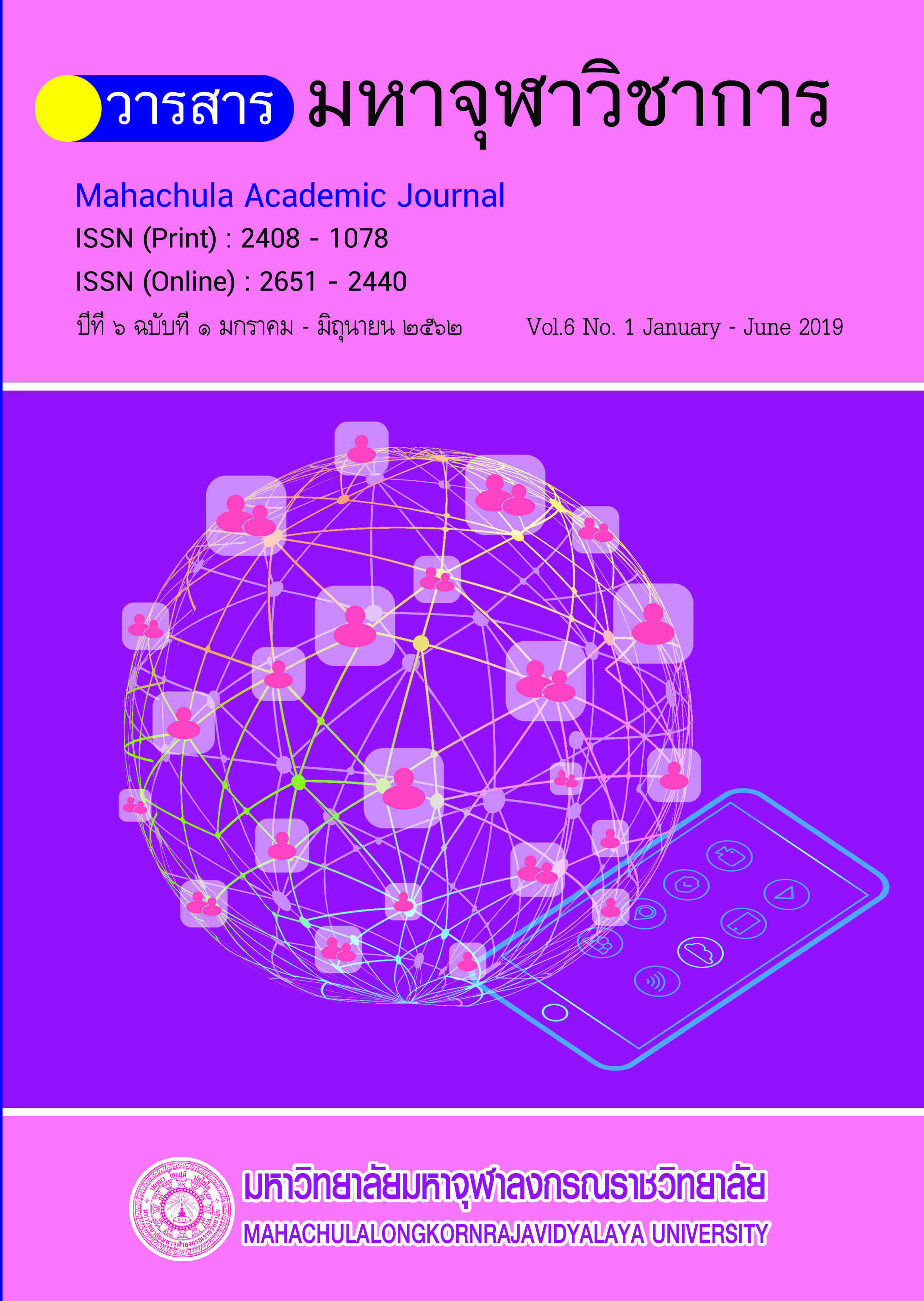Belief in Dhamma, Status and Political Belief of the Thai Sangha
Main Article Content
Abstract
ABSTRACT
In Thai society, Buddhism serves as a fundamental foundation affecting the social, political, and cultural aspects of the people’s way of life, with the Sangha Institution as a symbolic representation of existence, and with the monks as disciples whose duties are to study and practice the Dhamma as well as to disseminate it to citizens. With this in mind, a number of Thai intellectuals have tried to probe into the interaction beween Buddhism and Thai politics in an effort to describe their interrelationship, if the relationship is harmonious it will result in the majority’s tranquility. Such investigations have shed light upon some issues relating to the Sangha and politics, for instance, between the process of Dhamma inculcation by the Sangha and political concept of the ruler and the ruled; the Sangha’s political behavior and the Thai political system; and the role of the Sangha with regard to social as well as political development.
These investigations, however, have not touched upon the issue of the Sangha’s fundamental belief, which forms the code of conduct of the Sangha both in secular and ecclesiastical aspects.
To this end the following questions were addressed:
- What are the Sangha’s religious and political beliefs?
- Are these two beliefs significantly correlated, if so in what way?
- Is the Sangha’s status correlated with the Sangha’s political belief, if so-in what way? And
- Do the differences in the Sangha’s status affect the correlation between the Sangha’s religious and political beliefs in any significant way, if so-on which direction?
The outcome of this Study should give a clearer perspective of the interaction between the Sangha and politics.
This study examines the Sangha in the Bangkok metropolitan only. The data was gathered from both documentary references and from the questionnaires distributed to a total of 439 Buddhist monks, randomly sampled from those in 399 Wat in 24 areas.
The findings of the study are as follows:
- The Sangha has stronger beliefs in the principles of rule by Dhamma, the methods of rule by Dhamma, and the way of life by Dhamma than in beliefs in Ariyasacca, Pancakkhandha, Tilakkhana, and Kamma. The more experience in the study of the Scriptures and the more Vassa the Sangha have, the more likely the stronger the former brliefs becomes.
- The Sangha holds a democratic political belief rather than an authoritarian political belief, in terms of principles, methods, and the way of life. The more experience in the study of the Scriptures the Sangha has, the more likely that the stronger the democratic political belief will become. It is also more likely that Mahanikai monks would hold a stronger democratic political belief than Dhammayuti monks would.
- The Sangha’s democratic political belief is more highly correlated with the strength of the belief in Dhamma, in the realm of the principles of rule by Dhamma, the methods of rule by Dhamma, and the way of life by Dhamma than in the realm of Ariyasacca, Pancakkhandha, Tilakkhana, and Kamma.
- The status of the Sangha in terms of the experience in the study of the Scriptures plays a significant part in the differences in Sangha’s political beliefs, in the realm of principles, methods, and the way of life. Sects and Sanghatikara, however, play a significant part in the differences in Sangha’s political beliefs only in the realm of methods and the way of life.
- The experience in the study of the Scriptures and the number of Vassa of the Sangha are two deciding status elements that significantly affect the correlation between political belief and the strength of the belief in Dhamma. That is to say the stronger the belief in Dhamma that Dhammika Bhikkhu, Palinnu Bhikkhu, Navaka Bhikkhu, Majjhima Bhikkhu and Thera Bhikkhu have, the stronger the belief in democratic principles, method, and the way of life, and at the same, the weaker the authoritarian political belief.
In summary, the essence of the interaction between the Sangha and politics is that the stronger the belief in the principles of rule by Dhamma, the methods of rule by Dhamma, and the way of life by Dhamma, the more likely the stronger the belief in democratic principles, methods, and the way of life will be rather than the authoritarian political belief. The more experience in the study of the Scriptures and the number of Vassa the Sangha has, the higher the correlation mentioned above becomes. In other words, the more experience in the study of the Scriptures, and the greater number of Vassa, as well as a stronger belief in the principles of rule by Dhamma, the methods of rule by Dhamma, and the way of life by Dhamma, the stronger the democratic political belief rather than the authoritarian political belief will. On the other hand, the status of sects, Sanghaddhikara, and Samanasak play only a minor role in the above-mentioned correlation.
Keywords: Belief in Dhamma, Political Belief, Status

